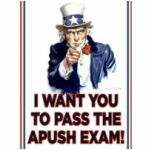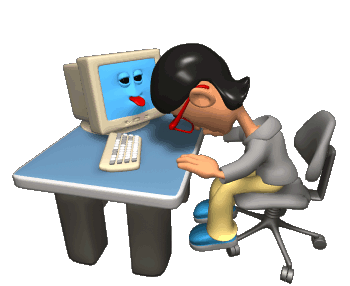| about_my_ap_class.docx | |
| File Size: | 187 kb |
| File Type: | docx |
| 2021-22_apush_ii_student_letter_2.docx | |
| File Size: | 189 kb |
| File Type: | docx |
APUSH II= (Advanced Placement United States History 2nd year)

Dear Students (and Parents),
Welcome to APUSH II (AP US HISTORY II)! This is an Advanced Placement course, which means that at the end of this year, you will be ready to take the AP US History Test. There are some key things that you need to know in order to succeed in my classroom this year.
We will be doing a lot of reading at home for this class. My advice to you is to EMBRACE IT! You will do well in life and in this course if you learn to love reading and do not treat it as a chore. Put your phone in sleep mode an hour before you go to bed and keep some reading material (it doesn't have to be history) on your bed table. You will sleep better and you will soon cherish that time where no one is texting you!
You will need a one and one-half-inch binder dedicated to this class. It will be difficult to pass this class without it. I expect you to keep all assignments organized in your binder according to Historical Period. In other words, don't throw anything away. At the end of each marking period you will receive a test grade for your binder (if you keep your assignments and take notes it is an easy A to average into your grade). You should regularly check Google Classroom for assignments and keep a schedule to pace yourself. All assignments should be handed in on-time to receive credit. Late work will not be graded for credit. It will also be important to save your notes from last year (US History I).
Expect about an hour of homework nightly (most of the time it will be less). You will have weekly assignments and you are expected to budget your time accordingly. Do NOT wait until the end of the week to complete everything. Class-time is reserved for Colloquium (fun!) and timed assignments (not so fun). Be prepared (with questions or opinions) before you come to class. I encourage you to form study groups and group chats to discuss assignments.
You do not ever need to bring your book to class; I keep a class set. So, binder and pen are all you need. That said, please frequently read and be familiar with your textbook. You may explore future chapters and review one’s we’ve covered already. History is not just one event happening after another- it’s all connected! You are also encouraged to watch The History Channel, You-Tube History Videos, and history oriented movies.
In an Honors/AP Class, there is often greater pressure to perform. I want to let you know that our classroom is a safe place to make mistakes. I promise you, if you follow my instructions and do your best, you will do well in our class. There is never a reason to “Copy and Paste” a response. I reserve the right to run any assignment responses through TURNITIN.COM. Also, although working together is a great way to increase your understanding and benefit from each other’s academic strengths, two people should never turn in the same response for their work. Two responses with identical or near identical responses will be considered the product of cheating. Please see my website to review our policy on academic integrity.
Finally, communication is very important to being a successful student in my class. If you are sick, have a special situation that will interfere with your work, or are feeling overwhelmed by the class, please see me privately during my office hours or email me to set up a screen chat. Self-advocating properly is a skill that will serve you well in life!
Please see your class webpage for more information.
I'm looking forward to a great year of AP U.S. History with you!
Sincerely,
Michael Tuttle
Teacher of AP History and Sociology
[email protected]
Please print out this letter (printable version is below), Have your guardian sign it, and make it the FIRST page of your binder.n
Welcome to APUSH II (AP US HISTORY II)! This is an Advanced Placement course, which means that at the end of this year, you will be ready to take the AP US History Test. There are some key things that you need to know in order to succeed in my classroom this year.
We will be doing a lot of reading at home for this class. My advice to you is to EMBRACE IT! You will do well in life and in this course if you learn to love reading and do not treat it as a chore. Put your phone in sleep mode an hour before you go to bed and keep some reading material (it doesn't have to be history) on your bed table. You will sleep better and you will soon cherish that time where no one is texting you!
You will need a one and one-half-inch binder dedicated to this class. It will be difficult to pass this class without it. I expect you to keep all assignments organized in your binder according to Historical Period. In other words, don't throw anything away. At the end of each marking period you will receive a test grade for your binder (if you keep your assignments and take notes it is an easy A to average into your grade). You should regularly check Google Classroom for assignments and keep a schedule to pace yourself. All assignments should be handed in on-time to receive credit. Late work will not be graded for credit. It will also be important to save your notes from last year (US History I).
Expect about an hour of homework nightly (most of the time it will be less). You will have weekly assignments and you are expected to budget your time accordingly. Do NOT wait until the end of the week to complete everything. Class-time is reserved for Colloquium (fun!) and timed assignments (not so fun). Be prepared (with questions or opinions) before you come to class. I encourage you to form study groups and group chats to discuss assignments.
You do not ever need to bring your book to class; I keep a class set. So, binder and pen are all you need. That said, please frequently read and be familiar with your textbook. You may explore future chapters and review one’s we’ve covered already. History is not just one event happening after another- it’s all connected! You are also encouraged to watch The History Channel, You-Tube History Videos, and history oriented movies.
In an Honors/AP Class, there is often greater pressure to perform. I want to let you know that our classroom is a safe place to make mistakes. I promise you, if you follow my instructions and do your best, you will do well in our class. There is never a reason to “Copy and Paste” a response. I reserve the right to run any assignment responses through TURNITIN.COM. Also, although working together is a great way to increase your understanding and benefit from each other’s academic strengths, two people should never turn in the same response for their work. Two responses with identical or near identical responses will be considered the product of cheating. Please see my website to review our policy on academic integrity.
Finally, communication is very important to being a successful student in my class. If you are sick, have a special situation that will interfere with your work, or are feeling overwhelmed by the class, please see me privately during my office hours or email me to set up a screen chat. Self-advocating properly is a skill that will serve you well in life!
Please see your class webpage for more information.
I'm looking forward to a great year of AP U.S. History with you!
Sincerely,
Michael Tuttle
Teacher of AP History and Sociology
[email protected]
Please print out this letter (printable version is below), Have your guardian sign it, and make it the FIRST page of your binder.n
Yearly Schedule
We keep to a tight schedule in AP and if you fall behind it will be difficult to keep up. I am ALWAYS available to my AP students for help, both academically or if you are just feeling stressed out- it will happen. Remember that you are in this course because either I, or another teacher felt you belonged here. struggling academically is expected in an AP class and if you are not struggling, you are probably not doing your best work. That said, Here is a the ideal schedule for our school year.
|
SEPTEMBER- Ch's 15-17
NOVEMBER- Ch's 21-23
|
JANUARY Ch's 26-28
FEBRUARY- Ch's 29-30
MAY- AP TEST
Research Project (TED Talk, 2 weeks) Movie- The Secret Life of Walter Mitty |
The College Board’s Advanced Placement Program® (AP®) enables students to pursue college-level studies while still in high school. Through more than 30 courses, each culminating in a rigorous exam, AP provides willing and academically prepared students with the opportunity to earn college credit, advanced placement, or both. Taking AP courses also demonstrates to college admission officers that students have sought out the most rigorous course work available to them.
Each AP course is modeled upon a comparable college course, and college and university faculty play a vital role in ensuring that AP courses align with college-level standards. Talented and dedicated AP teachers help AP students in classrooms around the world develop and apply the content knowledge and skills they will need later in college.
Each AP course is modeled upon a comparable college course, and college and university faculty play a vital role in ensuring that AP courses align with college-level standards. Talented and dedicated AP teachers help AP students in classrooms around the world develop and apply the content knowledge and skills they will need later in college.
Course Details Course Resources
Learn about the exam.
APUSH Unit Test Resources and Strategies:
- AP United States History Course and Exam Description (PDF) (Opens in new window)
- AP US History Modules from Gilder Lehrman Center AP US History Modules from Gilder Lehrman Center (Opens in new window)
- AP U.S. History Practice Exam (PDF) (Opens in new window)
- American and National Identity
- Politics and Power
- Work, Exchange, and Technology
- Culture and Society
- Migration and Settlement
- Geography and the Environment
- America in the World
- 1491-1607
- 1607-1754
- 1754-1800
- 1800-1848
- 1844-1877
- 1865-1898
- 1890-1945
- 1945-1980
- 1980-present ( in all likelihood, we will not get to this before May)
- Practice 1: Analyzing historical evidence
- Practice 2: Argument development
- Skill 1: Contextualization
- Skill 2: Comparison
- Skill 3: Causation
- Skill 4: Continuity and change over time
- Provide you with the reasoning skills and enduring understandings necessary to deal critically with the main issues and documents of U.S. history
- Prepare you for intermediate and advanced college courses by making demands upon you equivalent to those made by full-year introductory college courses
- Enable you to assess historical sources — their relevance to a given interpretive problem, their reliability, and their importance — and to weigh the evidence and interpretations of the past presented in historical scholarship
- Develop the skills necessary to arrive at conclusions on the basis of an informed judgment and to present reasons and evidence clearly and persuasively in an essay format
- Train you to analyze and interpret primary sources, including documentary materials, maps, statistical tables, and pictorial and graphic evidence of historical events
- Teach you to take notes from both printed materials and lectures or discussions, to write essay examinations, and to write analytical and research papers
- Enable you to express yourself with clarity and precision and know how to cite sources and credit the phrases and ideas of others
Learn about the exam.
APUSH Unit Test Resources and Strategies:
- Textbook: Review the unit openers and the summary of each chapter. Skim the section headings and subheadings. Ask yourself what you know about each section or subsection. Skim the bolded terms. Review any notes or annotations of the chapter.
- Unit Review Guides: The unit tests and APUSH exam come from the CB concept outline so make sure you really understand the Key Concepts, Supporting Concepts, and Topics from your unit review guides. Your notes and examples are what you need to know for the short answer and essay questions.
- Practice Stimuli Multiple Choice Questions: Learnerator and Five Prep both have free (and paid) practice stimuli multiple choice questions of varying quality.
- AMSCO Review Book (Don't Buy Until New Version is Released in November 2017): this is an excellent supplement to use alongside the textbook. It will help you review important material in a more concise format than your textbook and can also help clarify any difficult to understand concepts.
- Gilder Lehrman: The short video overviews of each unit by a historian are excellent for review. The site also contains a robust timeline, documents and other resources for each historical time period.
- Gilder Lehrman (SAT II US History): GL also has an excellent set of resources to prepare for the SAT II US History exam with video overviews, annotated timelines and other features. Even though this page is designed for the SAT II, the content review can still be very helpful for the APUSH exam.
- This course continues the chronological survey of American History from 1898 to the present. Special emphasis is devoted to studying the transformation of the United States from a rural, agrarian, predominantly Protestant, and individualistic society to an urban, industrial, pluralistic, and institutional society. In addition, emphasis is placed on America's significant role in world affairs. New Jersey State History and the role of minorities will be studied throughout. The purpose of this course is to provide students with an in-depth understanding of the institutions that form the basis of our unique American culture and an appreciation of our democratic heritage. The writing of frequent short analytical papers and document essays emphasizes the development of writing and critical thinking skills. A college level text is read, as are articles from scholarly journals and books of readings. A typical workload for one week would include twenty-five to fifty pages of reading, the writing of two essays, and one or more quizzes. This course culminates in the Advanced Placement exam in May. After the exam students will embark on an overview of American Culture from 1900 to 2001 and will be required to complete a term paper as well. Students not taking the AP exam will also be required to take a final exam.




